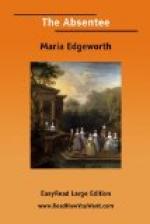Lord Colambre, of course, assured the count that he was not tired. Indeed, the enthusiasm with which this old officer spoke of his profession, and the high point of view in which he placed it, increased our hero’s desire to serve a campaign abroad. Good sense, politeness, and experience of the world preserved Count O’Halloran from that foible with which old officers are commonly reproached, of talking continually of their own military exploits. Though retired from the world, he had contrived, by reading the best books, and corresponding with persons of good information, to keep up with the current of modern affairs; and he seldom spoke of those in which he had been formerly engaged. He rather too studiously avoided speaking of himself; and this fear of egotism diminished the peculiar interest he might have inspired: it disappointed curiosity, and deprived those with whom he conversed of many entertaining and instructive anecdotes. However, he sometimes made exceptions to his general rule in favour of persons who peculiarly pleased him, and Lord Colambre was of this number.
He this evening, for the first time, spoke to his lordship of the years he had spent in the Austrian service; told him anecdotes of the emperor; spoke of many distinguished public characters whom he had known abroad; of those officers who had been his friends and companions. Among others he mentioned, with particular regard, a young English officer who had been at the same time with him in the Austrian service, a gentleman of the name of Reynolds. The name struck Lord Colambre; it was the name of the officer who had been the cause of the disgrace of Miss St. Omar—of Miss Nugent’s mother. ‘But there are so many Reynoldses.’
He eagerly asked the age—the character of this officer.
‘He was a gallant youth,’ said the count, ’but too adventurous—too rash. He fell, after distinguishing himself in a glorious manner, in his twentieth year—died in my arms.’ ‘Married or unmarried?’ cried Lord Colambre.
’Married—he had been privately married, less than a year before his death, to a very young English lady, who had been educated at a convent in Vienna. He was heir to a considerable property, I believe, and the young lady had little fortune; and the affair was kept secret from the fear of offending his friends, or for some other reason—I do not recollect the particulars.’
‘Did he acknowledge his marriage?’ said Lord Colambre.
‘Never till he was dying—then he confided his secret to me.’
‘Do you recollect the name of the young lady he married?’ ’Yes—Miss St. Omar.’
‘St. Omar!’ repeated Lord Colambre, with an expression of lively joy in his countenance. ’But are you certain, my dear count, that she was really married, legally married, to Mr. Reynolds? Her marriage has been denied by all his friends and relations—hers have never been able to establish it—her daughter is—My dear count, were you present at the marriage?’




